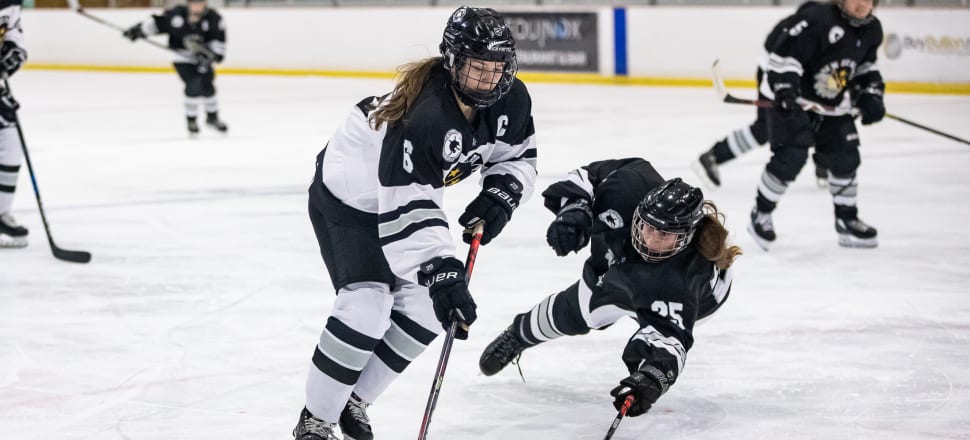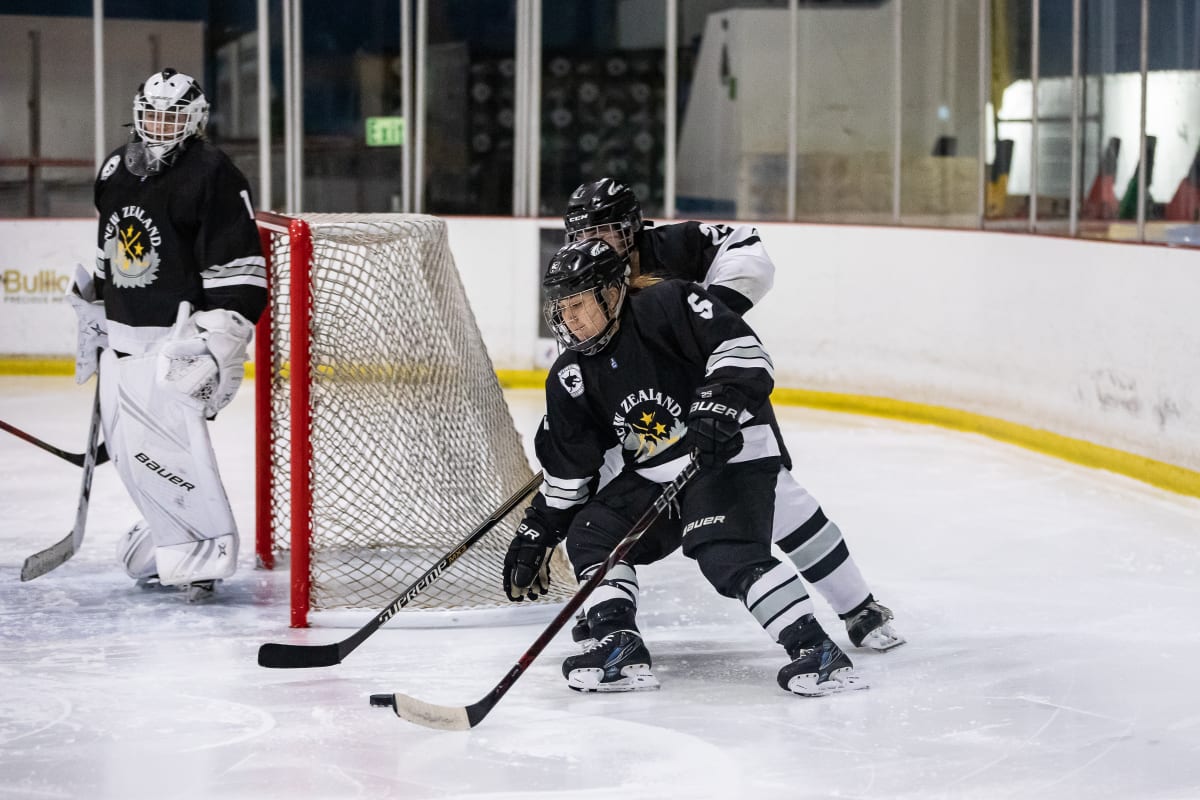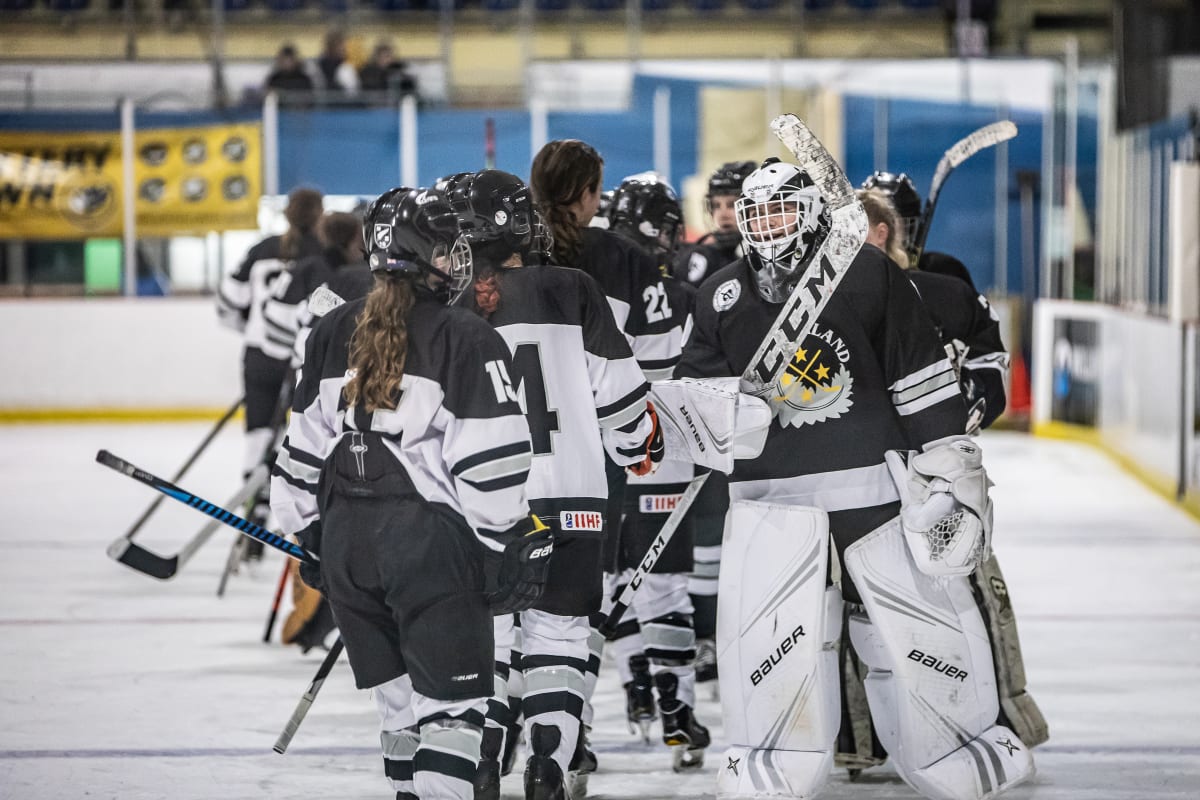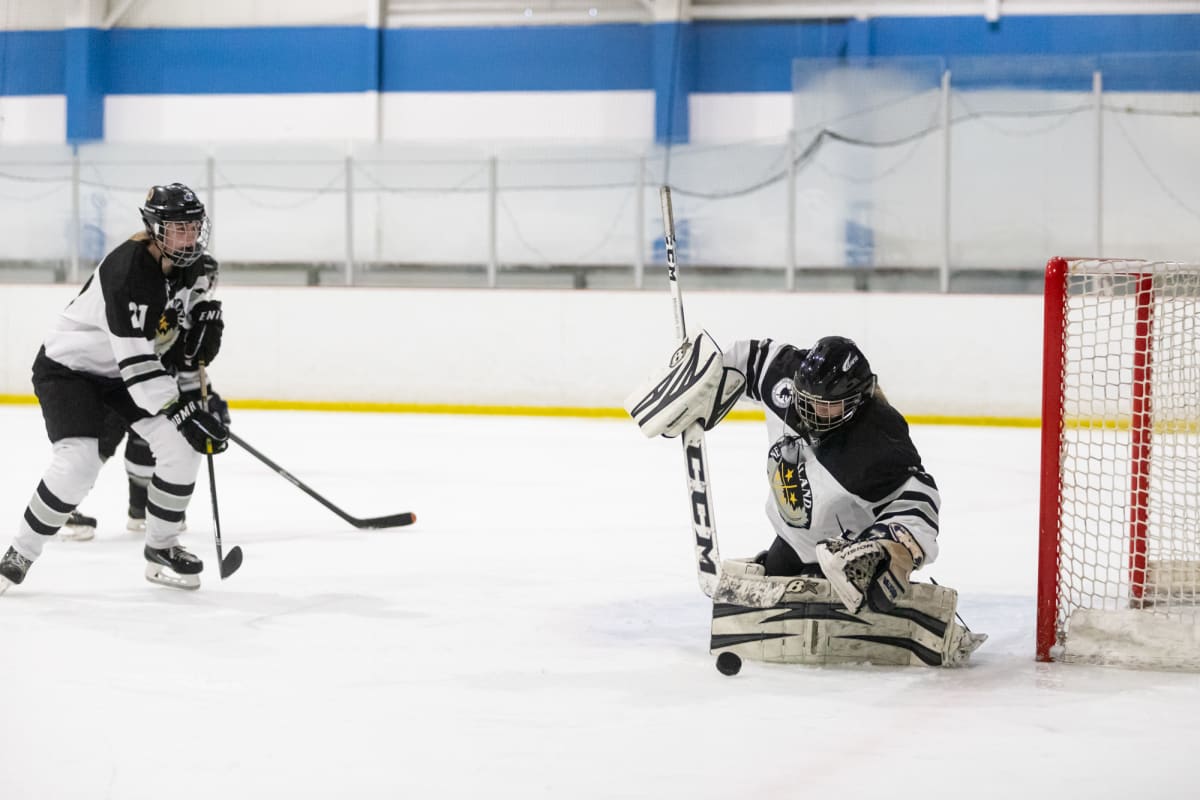
The Ice Fernz have come from diverse walks of life - and through the floodwaters of Cyclone Gabrielle - to reach the ice hockey world champs in Cape Town, Suzanne McFadden discovers.
The women of the Ice Fernz are not to be trifled with on or off the ice.
Take Bella Vogel as a perfect example. She walked through knee-deep floodwater and mud, lugging her brand new ice hockey gear, to join the New Zealand team who flew out of Auckland to Cape Town on Tuesday night.
A late call-up to the team travelling to next week’s world ice hockey championships, Vogel was trapped at Bethells Beach during the peak of Cyclone Gabrielle’s fury. With the help of her dad and a fire fighter, she walked several kilometres to get to safety.
“It just goes to show the resolve of these women,” Ice Fernz coach Jeff Boehme says.
Bella Vogel walked through landslips and floodwaters to join her Ice Fernz team-mates
Their day jobs reaffirm that.
Dr Helen Murray, the former captain of the Ice Fernz, is a highly-regarded neuroanatomist who studies a form of dementia associated with repeated head injuries.
The Ice Fernz new captain, Jaime Jones, is on the path to becoming an apprentice electrician.
Defender turned attacker Rikki-Lee McLean is a full-time firefighter, who helped with the clean-up after Auckland’s atrocious flooding.
Anjali Mulari is a Hamilton policewoman, specialising in fingerprint analysis. Already an eight-time world championship veteran, she’s just returned to the ice after having two children.
And Rebecca Lilly, from Gore, now lives in Austria playing in the European Women’s Hockey League.
There’s also a nurse and a fitness guru among the team bound for the IIHF division II group B world championships
Boehme says they’re quite an eclectic bunch, which is “definitely a good thing”.
“As amateurs, where they don’t get paid to play, they always bring so much passion with them,” the French-born coach says.
“Some of them from a financial point of view have put hockey first in their lives. We have a few veterans who say they’d have a house deposit by now if they weren’t playing.
“And all coming from very different careers, they have a lot of respect for each other. So they know what it takes to play for their country. They’re a pretty amazing group of women.”

It’s been three years since the Ice Fernz last played in international competition; in a pandemic-interrupted world, New Zealand Ice Hockey decided to withdraw the team from the world championships in 2021 and 2022.
Captain Jones was forced to miss the world championships in Iceland early in 2020, with a bad concussion. “I was left behind once, and it was awful, so I’ll never get left behind again,” she says.
The 24-year-old grew up in west Auckland and went with her family to the local iceskating rink every school holidays.
“A coach recognised my brother’s good skating technique and encouraged him to give hockey a go. I tagged along and fell in love with it instantly,” she says.
Her two brothers – and even her mum – started playing. Now her brothers also play for New Zealand.
But Jones wore the black jersey first, playing for the Ice Fernz when she was just 15.
She finished her high school years in Canada on a scholarship to the Ontario Hockey Academy. “The idea was to be exposed to top hockey and eventually play in a college team in Canada or the US,” Jones says.
“But when it came to the end of my high school career I didn’t know what I wanted to study, and I missed home so much, I came back. I realised the best place for me to play my hockey was in New Zealand.”
Jones worked as a sports co-ordinator at her old school, Massey High, and returned to playing in the Auckland and national leagues.
But after the lockdowns, she had a momentous change in career. A “very practical person”, Jones started working as a roofer with her dad, then discovered an interest in electrical engineering. She now works as an electrical trade assistant, and will soon start an apprenticeship to become an electrician.

She’s had another change of role this year becoming captain of the Ice Fernz.
“I guess I’ve been playing for a long time and I’m well respected across all the leagues I play in,” she says. “I love the fact Helen is right there by my side getting me through this transition.”
Boehme agrees. “Jaime is highly regarded by her teams and coaching staff. She has a great personality, she’s humble and very competitive,” he says.
“It was time to hand the baton on to someone else. And we saw Helen could help Jaime find her feet as captain.”
Rikki-Lee McLean often finds herself going straight from an ice hockey match and into a night shift at the fire station of the Auckland Airport Emergency Service.
“I sometimes miss a training because I’m on a shift or I get lucky and it’s a morning training and I’m on night shift,” the 28-year-old says.
McLean was working as a volunteer fire fighter in Queenstown when she was introduced to the ice.
“I was 21, and needed a job and there was one at Queenstown Ice Arena teaching kids to skate, but I needed to learn to skate first. I started playing hockey from there,” she says. “I’d tried all kinds of sport as a kid, from kayak polo to netball and touch.
“As a firefighter, hockey didn’t look too scary to me. I love the competitiveness and the physicality of it. And we’re fortunate women have to wear cage face masks.”
McLean became a full-time firefighter, moving to Auckland for work in 2020, and managed to balance her two worlds – one in fire, one on ice.
The national women’s ice hockey league has four teams in Queenstown, Dunedin, Christchurch and Auckland. McLean had wanted to continue playing for Wakatipu Wild (the 2022 champions) but switched to Auckland Steel.
“Wellington is pushing for a team, inline hockey is quite strong there,” she says.

In a sport which has more than 2000 players nationwide playing across 10 ice rinks, the women’s side of the sport is growing, Boehme says.
“The male game is becoming more technical and less physical contact. There’s no body checking in the female game, so they already have the tendency to play technically,” he says. “And in terms of entertainment, the women’s game is just as good as the men’s.”
The Future Fernz have just arrived home for the world U18 women’s championships in Sofia, Bulgaria, celebrating their first game victory at this level, 4-2 over the home nation.
Among the stars of that side was Katya Blong, who won gold at the 2020 Winter Youth Olympics in the multinational team – the only Kiwi to have ever won gold at the Games. Her success as a 14-year-old may have spurred new interest among young women.
New Zealand’s world ranking in ice hockey has fluctuated between 24th and 31st since the world championships began in 2014, and it’s not easy to make it to the next level of competition.
But players and coach are confident this Ice Fernz team can perform well in South Africa.
“Our team is super dedicated and looking super good on the ice. We just have to keep the momentum and we could do really well,” Jones says. “Our biggest competition is Australia, and we play them first up. It’s the best way to judge where you’re at.”
Boehme says the Fernz are hungry to play at this level after a three-year absence. “Part of it is the sheer joy to have a go again,” he says.
“To progress up to the next division is a very tough challenge, that requires a lot of time and investment.
“But one thing that always amazes other nations about our team is our level of passion for the game.”







